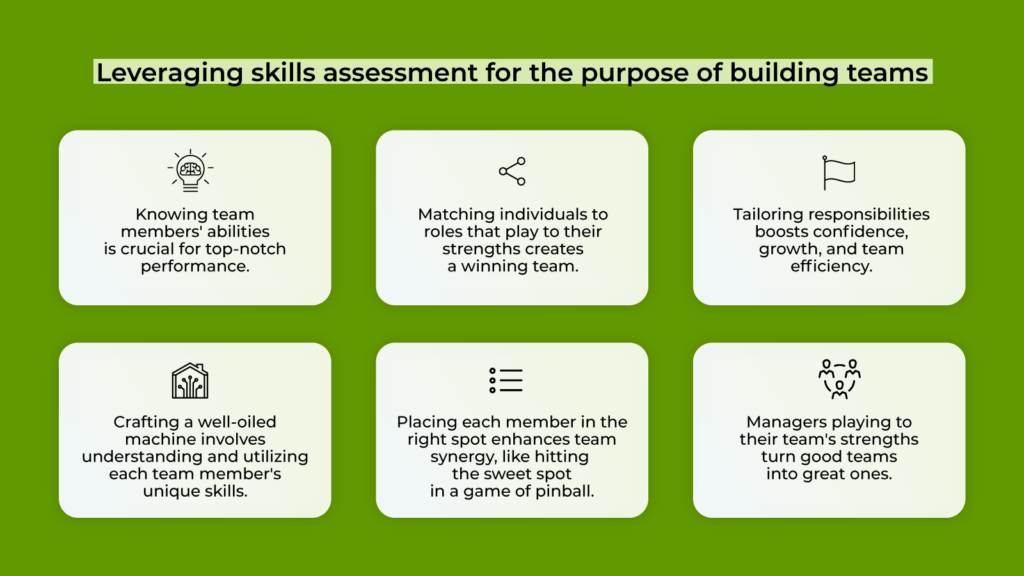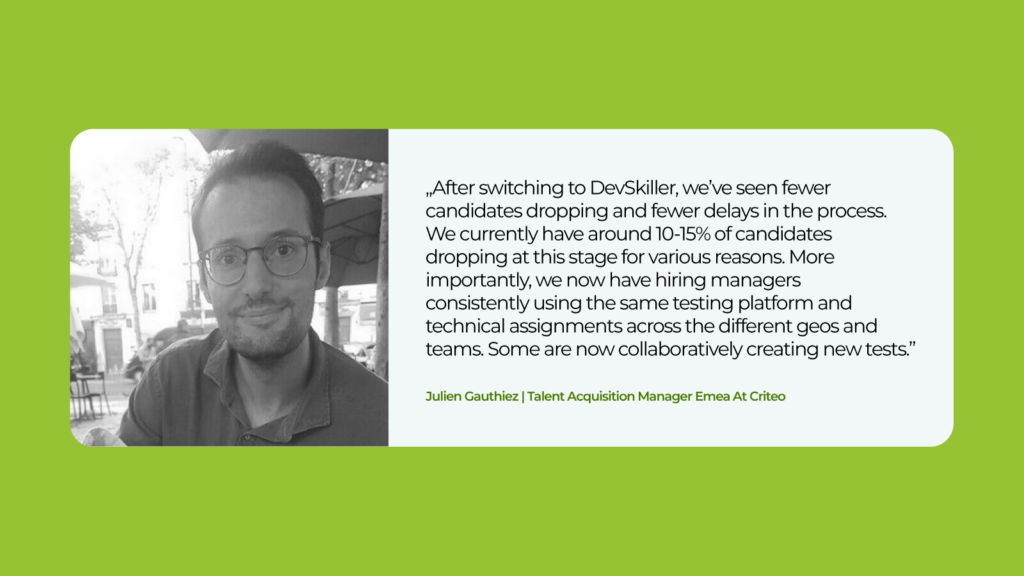Why skills assessment is a gateway to organizational success

Skills assessment is more than just fancy talk in the business world; it’s a key practice that gives both individuals and companies an edge. So, what does it mean?
In simple terms, it’s about taking a good look at what skills someone has. This isn’t just useful; it’s super helpful for figuring out career steps, making hiring better, and making teams work smarter.
When companies do a good job assessing skills, they get to see what their team is great at and what they could do better. This means they can help their employees learn and grow in ways that matter, lining up with what the company needs and what the employees want to achieve.
For people looking for jobs, being able to show off their skills can help them stand out. And for teams, knowing who’s good at what can make everyone work together better and get more done.
In today’s business game, being sharp at figuring out and growing skills is super important. It’s key for staying fresh and creative. So, putting a strong system in place for checking out skills is a smart move for any business that wants to keep winning in the competitive world.
- Understanding the different types of skills assessments
- Key components of a skills assessment
- The role of skills assessment in career development
- How to prepare for a skills assessment
- Utilizing skills assessment for team building
- Integrating skills assessment into recruitment
- Technological advancements in skills assessment
- Skills assessment for organizational development
- Overcoming the challenges in skills assessment
- Case study: Skills assessment in action
- International standards for skills assessment
- Preparing for the future: The next generation of skills assessment
- Conclusion: The way forward with skills assessment
- FAQ
Understanding the different types of skills assessments
When we talk about skills assessments, we’re referring to a few different types:
- Self-assessment: This is when individuals evaluate their own abilities, which requires introspection and honesty.
- Formal assessment by an external body: These are standardized tests or evaluations conducted by professional bodies to gauge an individual’s skills in a specific area.
- Informal workplace assessments: Often carried out by supervisors or colleagues, these assessments are more about day-to-day performance and soft skills.
Key components of a skills assessment
A comprehensive skills assessment will look at:
- Technical skills evaluation: How well can you perform specific tasks related to your job?
- Soft skills analysis: Do you have the teamwork, leadership, and communication skills needed to excel?
- Psychological aptitude and personality: Are you mentally prepared for the job, and is your personality a good fit for the role?
The role of skills assessment in career development
Here’s where it gets interesting. Skills assessments can be a north star for your career progression. They help you:
- Identify strengths and weaknesses: Knowing what you’re good at and where you need improvement is invaluable.
- Plan your career path: With a clear understanding of your abilities, you can make informed decisions about the direction of your career.
How to prepare for a skills assessment
Being ready is everything. Get the lowdown on what’s coming, polish up your skills, and tackle the assessment with an attitude that’s all about getting better.
Getting ready means you won’t be caught off guard. Take some time to understand what the assessment will involve. Then, give your skills a quick tune-up.
When you sit down to take the next assessment test, remember it’s not just a test—it’s a chance to grow and learn. Keep your mind open to the idea that every challenge is a step toward getting even better at what you do.
Utilizing skills assessment for team building
For managers, really knowing the ins and outs of your team’s abilities is like finding the secret sauce for top-notch performance. It’s all about matching the puzzle pieces – when you fit people into roles that play to their strengths, you’re setting up the whole team for a win.
This isn’t just about filling slots; it’s about crafting a well-oiled machine where everyone’s talents shine and contribute to the bigger picture.

Take the time to dig deep and understand the unique skills each team member brings to the table. This way, you can tailor their responsibilities in a way that not only boosts their confidence and growth but also amps up the team’s efficiency.
When each member is in the right spot, doing what they do best, it’s like hitting the sweet spot in a game of pinball – everything just flows and the score keeps going up. That’s the power of a manager who plays to their team’s strengths – it turns good teams into great ones.
Integrating skills assessment into recruitment
Hey recruiters, here’s a game-changer for you: weaving skill assessments into the fabric of your hiring routine can really sharpen the way you pick your candidates. It’s like having a roadmap that leads you to the right person for the job.
Skill assessments give you the inside scoop on who’s got the goods to excel in the role, making your decision-making and hiring process smoother and smarter. When you’ve got skill assessments in your toolkit, you can sift through the crowd and spot the gems with way more confidence. You’re not just relying on gut feelings or impressive resumes—you’ve got hard data on what each candidate can do.
This process not only speeds things up but also ups your odds of finding someone who’ll hit the ground running and mesh well with your team. In the hiring world, that’s pure gold.
Technological advancements in skills assessment
Thanks to the digital boom and the smarts of AI, skill assessments have leveled up big time. Now, they’re easy to get to and sharper than ever. These high-tech tools dive deep to give you the lowdown on a person’s skills, offering a clearer and more on-point picture of what they can really do.
This isn’t just about ticking boxes or running through a checklist. It’s a whole new ball game where AI crunches the numbers and spots patterns we might miss. This means you can get a more complete understanding of a candidate’s abilities and how they’ll fit into your team. For anyone in the business of hiring, this is the kind of tech that can really make a difference, giving you the edge in finding the right fit for any job.
Skills assessment for organizational development
Skill assessments are like the compass that helps steer the ship. They line up what your team can do with where your business wants to go, playing a big role in plotting the course for the future. It’s not just about knowing your crew’s talents today but also about figuring out who’s ready to take the helm tomorrow.
When you use skill assessments, you’re not just guessing who’s best for what job; you’re making informed choices. This helps with planning big moves and making sure you’ve always got the right people ready to step up. It’s about being prepared, staying on target with your business aims, and keeping the journey smooth even when it’s time for someone new to lead the way.
Overcoming the challenges in skills assessment
Subjectivity and bias can be hurdles in skills assessment. Ensuring fairness and inclusivity is paramount to the integrity of the process.
Case study: Skills assessment in action
Criteo, an established leader in commerce marketing, has greatly enhanced its recruitment process by incorporating DevSkiller.
This case study explores how Criteo, with over 2,800 employees and 31 global offices, streamlined its technical hiring practice to support its annual recruitment of 100 technical professionals, including solutions engineers, data analysts, and front-end developers.
Previously, Criteo’s approach to screening technical job candidates involved at-home case studies as preliminary filters, which proved inefficient due to a lack of tracking and insight into candidate performance and often led to delays and inconsistent procedures across its various locations.
To address these challenges, in 2017, Criteo introduced DevSkiller, transforming their technical recruitment strategy. Julien Gauthiez, Talent Acquisition Manager EMEA at Criteo, notes significant time savings of 2-4 days per hire and improved conversion rates between interviews, with a more consistent and standardized skills assessment test and process.
This has not only alleviated the pressure on their Operations and HR departments but also increased productivity and resulted in cost savings.

The new streamlined recruitment process at Criteo now begins with a phone screening conducted by a recruiter, followed by a DevSkiller test serving as a technical interview, and concludes with standard interviews with hiring managers and stakeholders.
This method has been lauded for its consistency, reduced number of interviews without compromising hiring rates, and a candidate-friendly experience that allows applicants to engage with the test at their convenience and monitor their progress.
The switch to DevSkiller has resulted in a candidate drop-off rate of approximately 10-15% at the testing stage for various reasons. Importantly, hiring managers now consistently employ the same platform and technical assignments across different geographies and teams, with some even collaborating to create new tests.
This case study underscores Criteo’s commitment to improving the hiring experience for candidates, employers and hiring teams alike through innovative technical screening solutions.
International standards for skills assessment
Sticking to world-class best practices and ISO standards is like having a seal of approval on your assessment process.
It’s a guarantee that you’re not cutting corners and that you’re serious about the quality and impact of how you assess and evaluate skills.
When you follow these guidelines, you’re showing that your methods are up to par with the highest international benchmarks.
It’s a promise of consistency, reliability, and trustworthiness in your assessments, which means a lot to everyone involved – from the top brass to the newest recruits. It’s the gold standard that ensures you’re not just doing things right, but you’re doing the right things for effectiveness and fairness.
Preparing for the future: The next generation of skills assessment
The workforce is constantly changing, and our ways of assessing skills need to keep pace. To stay ahead, it’s crucial to predict which skills will be in demand in the future and to update our skills assessment tests and methods to match.

This forward-thinking approach ensures that we’re not just keeping up, but we’re setting the pace, ready to welcome new trends and technologies with the right talent in hand. It’s all about being proactive rather than reactive, preparing ourselves and our workforce for whatever comes next on the horizon.
Conclusion: The way forward with skills assessment
In the end, the goal of skills assessment is to pave the way for individual and organizational growth. By continuously refining this process, we ensure that the workforce remains agile and prepared for the challenges of tomorrow.
FAQ
- What’s the most effective way to conduct a skills assessment?
The most effective way to conduct a skills assessment is to use a combination of methods tailored to the individual or the job role. This for assessment tests often includes a mix of self-assessments, practical examinations, peer reviews, and standardized tests. Utilizing technology like AI-driven platforms can also enhance the process by providing a more detailed analysis of skills and performance.
- How often should skills assessments be conducted?
Skills assessments should ideally be an ongoing process, but a formal assessment is recommended at least once a year. This frequency ensures that employees’ skills remain current and aligned with their career progression and organizational changes. It also allows for timely identification of any skill gaps that may need to be addressed through training or professional development.
- Can skills assessments be tailored to specific industries?
Yes, skills assessments can and should be tailored to specific industries. Each industry has unique skill requirements, and a relevant skill assessment therefore should reflect the specific competencies and technical knowledge pertinent to that field. Customizing assessments helps ensure that they are valid and reliable indicators of an individual’s ability to perform in a particular industry context.
- What are some common mistakes to avoid during skills assessments?
Common mistakes to avoid during skills assessments include not clearly defining the skills being assessed, failing to provide a standardized assessment environment, and not taking into account the test-taker’s personal learning and communication styles. Additionally, relying solely on one type of assessment, such as only written tests for practical skills, can lead to an incomplete picture of an individual’s capabilities.
- How can organizations ensure the fairness of skills assessments?
Organizations can ensure the fairness of skills assessments by developing clear, objective criteria and ensuring that the same conditions are applied to all participants. They should be aware of and mitigate unconscious biases, and consider cultural and language differences among participants. Utilizing blind assessments, or personality tests where the evaluator is not aware of the candidate’s identity, can also help reduce bias. It’s essential to continuously review and update assessment methods to maintain their relevance and fairness.
DevSkiller has all of your technical skills assessments needs covered.
Schedule a demo with one of our product experts or watch this quick 5-min demo video to find out more.
Share post